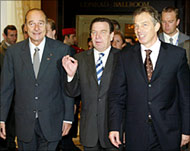The European alternative
For more than a decade, Europe and the US have been actively involved in promoting democratic reform in the Middle East.

While many of the goals have been the same, the policies of the two have differed significantly.
Europe’s role has consisted of less grand strategies and more low-key initiatives, such as the Euro-Mediterranean Partnership, commonly referred to as the Barcelona Process.
The US’s position on the other hand has fluctuated between active diplomatic engagement in the region – mostly during Bill Clinton’s years – to bold military and diplomatic moves by George Bush’s administration later on.
Outside efforts
According to Pascal Boniface, of the French International Institute of Strategic Studies, the contribution of outsiders – Europeans and Americans – has been a mixed bag.
“The problem is that the Arab perception of the United States is that they are only self-interested and Europe is not interested enough,” Boniface said, speaking recently at a seminar in Qatar on Europe’s role in the Middle East.
Engagement with the rule of law and human rights issues has been a hallmark of European activity in the region, with the high point being the secret Norwegian mediation that resulted in the 1993 Oslo Accords between the Palestinian leadership and Israel.
Although signed in Washington under US auspices, European officials were quick to point out that the US focus in the Middle East has been motivated – almost exclusively – by security interests, and this has hampered reform efforts.
US initiative
Recently, the Europeans’ dilemma increased with the sudden introduction of the US-devised Greater Middle East Initiative (GMEI), in which Europe is urged to take part.
The GMEI, to be officially unveiled in June 2004, is supposed to promote political and economic reform in Arab countries and other Muslim-majority nations, much like the Helsinki Initiative of 1975, which helped spur the transformation of Europe at the later stages of the cold war.
|
Recently, the Europeans’ dilemma increased with the sudden introduction of the US-devised GMEI |
But European governments have reacted with unease. They fear that US neo-conservatives will appropriate European ideas to support an agenda of “democratic imperialism” and that the GMEI will jeopardise their own quiet engagement under the Barcelona Process.
Thus, Europe is determined to stake out a distinctive approach to Middle East reform. However, as in the past, Europe has been galvanised by intensified US activity even as it rails against it.
‘Put up or shut up’
“It is high time for Europe to either put up or shut up,” says international relations analyst Dr Marwan Bishara of the European position vis-a-vis the Middle East.
“Europe talks too much and doesn’t act, and America acts, and seldom talks meaningfully with the Arabs,” says Bishara, himself a Palestinian Arab.
Accordingly, individual European governments and the EU collectively have stepped up their efforts to promote democracy in the Middle East in light of the US muscle-flexing.
For example, Denmark, Germany and the United Kingdom have unveiled new initiatives on Middle East reform. France, the Netherlands and Spain have increased governance funding for the region.
The European Commission (EC), the executive body of the EU, has promised increased aid for Arab governments that agree to consider human rights plans. So far Morocco and Jordan have expressed interest.
Moreover, the EC has redirected some of its mainstream development aid into human rights projects. It is also using long-running trade talks with Iran and Saudi Arabia as a basis for discussion about governance reforms in those countries.
Europe’s approach
An EU paper, prepared for the June G8 and EU-US summit, held consecutively, outlines the approach Europe is taking.
 |
|
Suggestions have come from |
The most distinctive element of the European initiative is its cooperative approach, which is predicated on “facilitating but not imposing change”, and on building partnerships with Middle Eastern countries.
The paper also calls for “engagement” in economic, social, cultural and educational affairs with Muslim countries.
The new British and German initiatives for the region, entitled ‘Task Force for Dialogue with the Islamic World’ and ‘Engaging with the Islamic World’, illustrate the partnership approach.
Aside from the familiar argument that reform must accompany a commitment to resolve the Arab-Israeli conflict, the sharpest European complaint about the GMEI is that Washington has not consulted adequately with Arab governments and civil society groups in the region.
European tendency
In fact, these initiatives seem inspired by the gradualist European approach of the past decade.
Europe’s long-standing propensity to focus diplomatic pressure and democracy aid on specific human rights cases, rather than overarching political and institutional reform, remain unchanged.
New European initiatives do not focus directly on democracy or earmark funds for democracy-building per se.
Activities relevant to political reform are quietly hidden within broader governance and development initiatives, the logic being that the more undeclared the objectives, the better their chance of success.
As such, the use of political conditionality remains anathema to most European states.
Arab-Israeli dilemma
And while European governments strongly assert that the promotion of democracy in the Middle East must be coupled with serious efforts to achieve Arab-Israeli peace, they also talk of shifting from regional programmes to an emphasis on bilateral ones.
Simultaneously, individual Arab states are encouraged not to allow the ongoing Arab-Israeli conflict from impairing the broader European reform agenda.
While the EU has been explicit in its objections to a heavy-handed US reform policy, it has been less clear on its alternative to the cliché, that reforms must come from within.
According to Bishara: “Rather than ritually warning the US government that democracy cannot be coerced, Europeans should address the shortcomings of their own approach.”